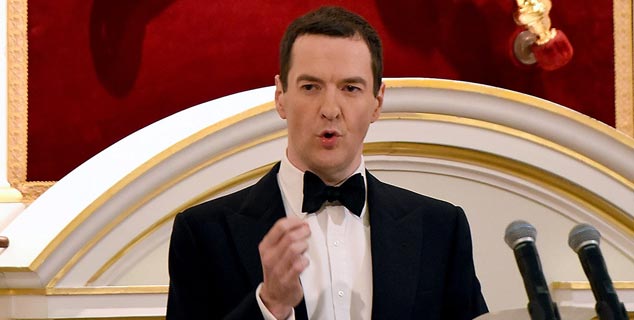
Margaret Thatcher once likened a nation’s accounts to a housewife’s budget. That is, don’t spend what you haven’t got.
And last night, the chancellor, George Osborne, made a similar decree. At his Mansion House address to the great and the good of the City, Osborne suggested a pact – that British governments will no longer spend more than they take in tax.
Rather than allowing the government of the day latitude to spend whatever it likes, the new regime will demand a balanced budget. If not balanced, then future governments will have to say why.
Now, chancellors of yore have made similar pledges, be it “spend within our means”, or “prudent, balanced budgets, within the business cycle”. So what’s new?
Well, this might look like a finely tuned bit of political theatre, putting the Labour party in a tricky position whether they vote yea or nay. But in reality, this is just common sense and harks back to the way things always used to be. And there’s a good reason for that…
Watch out for the skinny cows
There’s little doubt that Osborne is riding high on the wave of the last month’s electoral upset. In his view, the Conservative victory came down to a vote for a government that enshrined economic prudence.
As such, the plan now is to consolidate the government’s economic success and further embarrass the Labour party either by a) voting with government to enshrine the new doctrine (upsetting the far left); or b) by voting against the move, thereby highlighting once again that the opposition really isn’t very good with numbers.
But the fact is, a balanced budget has historically been the norm anyway. Those who talk about ‘Keynesian’ economics (spending to stimulate the economy) often forget that what Keynes actually said was that the government should run budget surpluses during the good times, thereby holding back some firepower to spur growth during recession.
And Keynes’ idea certainly wasn’t without historic precedent. Think of the Bible story of Pharaoh’s dream of seven fat calves and then seven skinny ones, and you’ll see that the idea of a managing an economy based on saving – be it grain, or money – is as old as the hills. This is not rocket science.
Historically, governments really only pumped up the debt during times of war. To ward off nasty invaders, national debt was seen as the lesser of two evils.
Exactly who owns the debt, and does it matter?
The reason governments of yore didn’t like debt, was because it was generally owed to some foreign party. Let’s not forget that in those days, debt really meant something. For example, boatloads of gold left British shores during the First World War, in order to pay the US for raw materials and food.
But in today’s climate, you could be forgiven for thinking that debt doesn’t matter. Many political/economic commentators say that if we are lending to ourselves, in a manner whereby gilts (government debt) are bought by pensioners, for instance, then it really doesn’t matter. We owe the money to ourselves!
To take it one step further, if the Bank of England buys said debt through QE wizardry, then the debt can be magicked away anyway.
Oh, if only it were that simple. Let me outline why debt matters, and why Osborne is right to get things back on track.
Laziness never helped anybody
In many ways, it’s true that debt doesn’t matter. Raise debt, or print money (kind of the opposite), and the real economy will adapt to cope with the situation. Only if punters lose faith in the currency will it lead to the horrors of inflation.
But let’s not go there just now. The real issue is that debt is a way of offsetting tax for a later date. That’s why it’s so dangerous, and that’s why politicians love it so much. Bribe the electorate today, and let tomorrow’s taxpayers foot the bill (with interest, of course).
That is why Osborne is right to say that it’s morally wrong. Not only is it morally wrong, but cheap money (or free money, for that matter), also has a nasty habit of getting mis-spent. There are few checks and balances on a budget backed by blank cheques.
How do you ensure the NHS doesn’t get ripped off by cunning medical staff recruitment firms? You make sure that budgets are tight. You don’t offer a blank cheque – as with anyone’s finances, sobriety and prudence must be instilled.
Governments aren’t like individuals: it may be good for us to borrow against a house, especially when we’re young; we may equally save into a pension, and draw the benefits in later years. But the national accounts have an infinite lifespan – only when that life is threatened (think war) should public borrowing be seen as a good thing.
Nations that borrow endlessly become worse off, not better off. It leads to lazy decision-making, and bad macro-economic policy. Well done George!